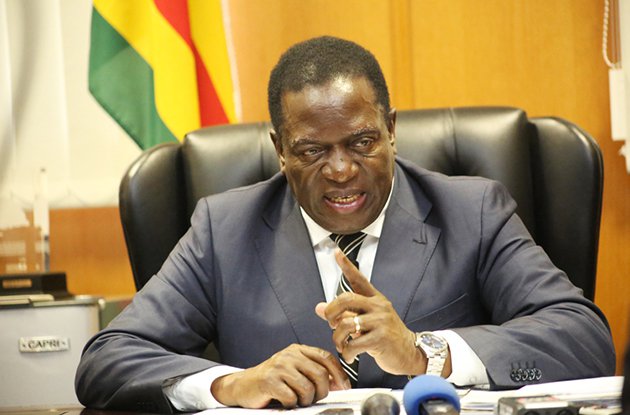News / National
Mnangagwa 'command' banks to reduce charges
29 Jun 2017 at 05:33hrs |
1300 Views

VICE-PRESIDENT Emmerson Mnangagwa has challenged financial institutions to bring down their charges to reduce the demand for cash and long queues at banks which have now become a permanent feature across the country.
Officially opening the 2017 Zimbabwe National Chamber of Commerce annual congress in Victoria Falls yesterday, Mnangagwa said the transaction and precautionary demand for money continued to surge every day as evidenced by long and winding queues at banks.
"This cumulative demand for cash will be tamed to zero if the cost of transacting using debit cards becomes negligible. However, I want to recognise those of our financial institutions who are making efforts to get more point-of-sale machines with a view to encouraging financial inclusion through use of plastic money," he said.
"Charges on the use of plastic money are considerably high as compared with those of other countries within the region. I, therefore, urge our banks to consider reviewing these transaction costs downwards. The advantages of the use of plastic money are innumerable, and, thus, I urge our businesses to fully embrace the use of ICT solutions."
Mnangagwa said a challenge remained with peri-urban and rural folk who were still resisting plastic money.
The high cash demand is being driven by continued mistrust in government and the Reserve Bank of Zimbabwe (RBZ), which is causing depositors to seek hard cash by queuing at their respective banks.
This has resulted in many depositors sleeping in queues outside banks.
Financial experts say the cash demand can only by quenched if authorities restore confidence in banks by giving incentives.
Mnangagwa's calls for the reduction of bank charges is envisioned to act as an incentive to depositors to rely more on their bank cards than hard cash.
Pleas to banks come after they kept 70% of the $2,4 billion in foreign currency earned in the first five months of the year.
In a circular to the banks from the RBZ in December 2016, noted that while cash withdrawal limits had been reduced significantly, withdrawal charges remained high.
At the time, the central bank said banking institutions needed to re-examine cash withdrawal charges in order to offer affordable banking services consistent with the financial inclusion thrust.
Currently, cash withdrawal charges of 1% and 1,25% for an amount withdrawn from an automated teller machine and over-the-counter, respectively, are in effect, but most banks are not using these charges.
Officially opening the 2017 Zimbabwe National Chamber of Commerce annual congress in Victoria Falls yesterday, Mnangagwa said the transaction and precautionary demand for money continued to surge every day as evidenced by long and winding queues at banks.
"This cumulative demand for cash will be tamed to zero if the cost of transacting using debit cards becomes negligible. However, I want to recognise those of our financial institutions who are making efforts to get more point-of-sale machines with a view to encouraging financial inclusion through use of plastic money," he said.
"Charges on the use of plastic money are considerably high as compared with those of other countries within the region. I, therefore, urge our banks to consider reviewing these transaction costs downwards. The advantages of the use of plastic money are innumerable, and, thus, I urge our businesses to fully embrace the use of ICT solutions."
Mnangagwa said a challenge remained with peri-urban and rural folk who were still resisting plastic money.
The high cash demand is being driven by continued mistrust in government and the Reserve Bank of Zimbabwe (RBZ), which is causing depositors to seek hard cash by queuing at their respective banks.
Financial experts say the cash demand can only by quenched if authorities restore confidence in banks by giving incentives.
Mnangagwa's calls for the reduction of bank charges is envisioned to act as an incentive to depositors to rely more on their bank cards than hard cash.
Pleas to banks come after they kept 70% of the $2,4 billion in foreign currency earned in the first five months of the year.
In a circular to the banks from the RBZ in December 2016, noted that while cash withdrawal limits had been reduced significantly, withdrawal charges remained high.
At the time, the central bank said banking institutions needed to re-examine cash withdrawal charges in order to offer affordable banking services consistent with the financial inclusion thrust.
Currently, cash withdrawal charges of 1% and 1,25% for an amount withdrawn from an automated teller machine and over-the-counter, respectively, are in effect, but most banks are not using these charges.
Source - newsday
Join the discussion
Loading comments…





































